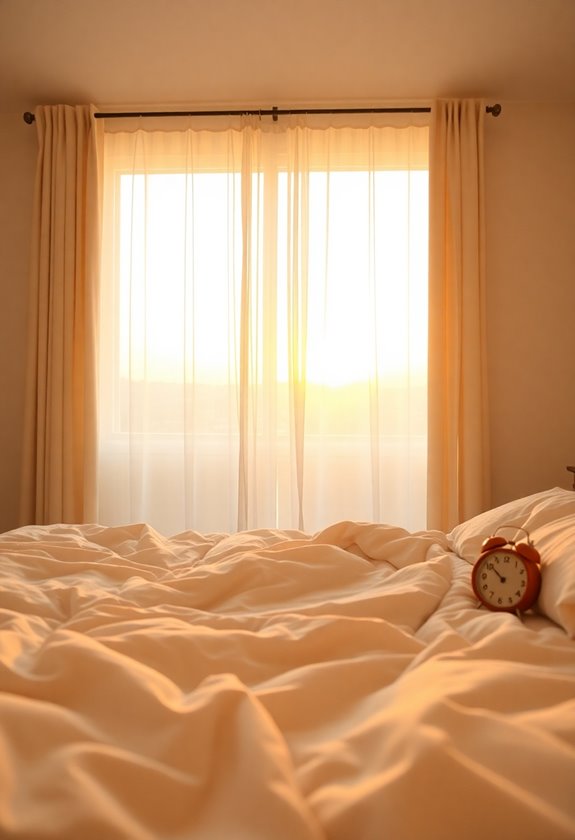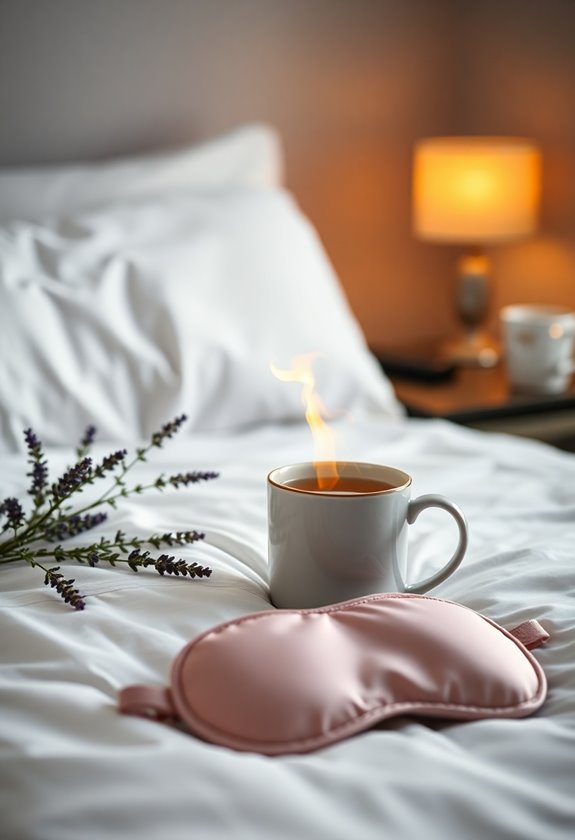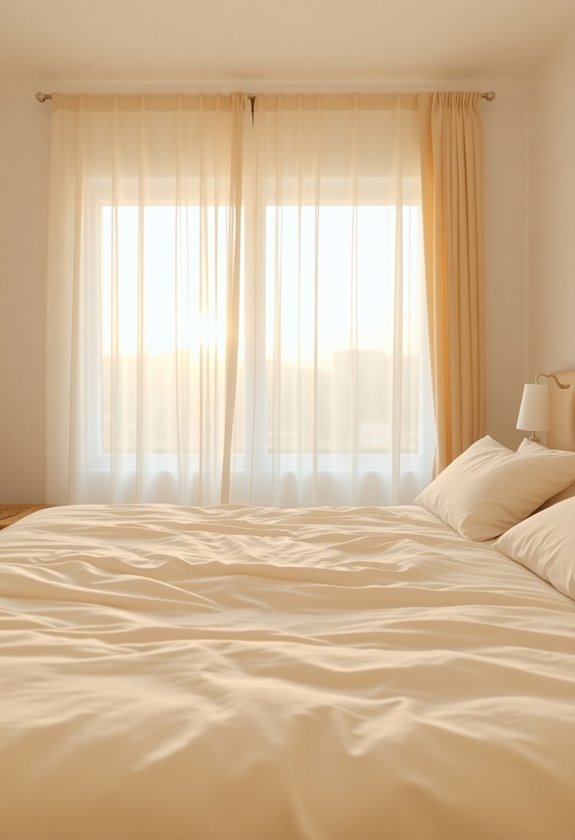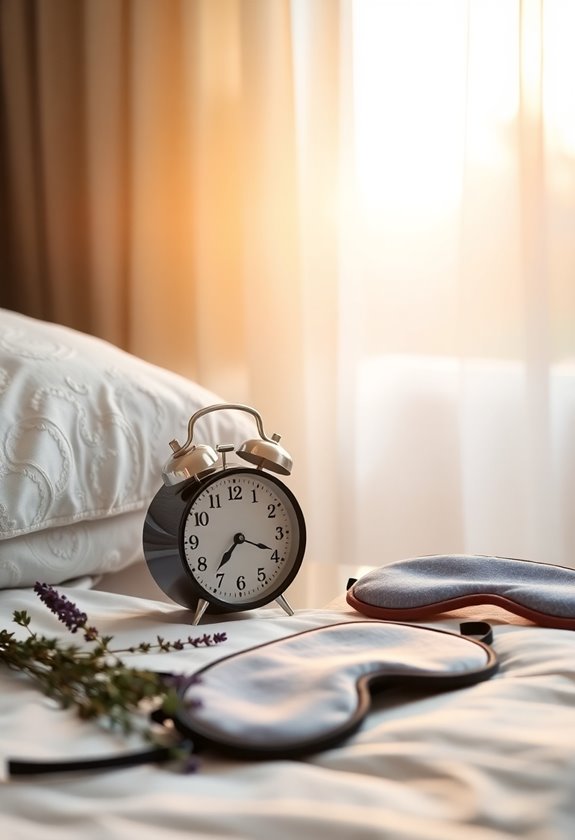You can reset your broken sleep schedule with three proven natural methods. First, maximize your morning light exposure by spending 20-30 minutes outside shortly after waking, which helps regulate your body’s internal clock. Second, establish a consistent 30-minute bedtime routine that includes calming activities like reading or gentle stretching, while avoiding screens and bright lights. Third, incorporate at least 20 minutes of daily physical activity, preferably outdoors, as regular exercise greatly improves sleep quality. Understanding these foundational elements will help you develop a more thorough approach to restoring healthy sleep patterns.
Highlights
- Get consistent morning sunlight exposure within one hour of waking to reset your body’s natural sleep-wake rhythm.
- Create a calming 30-minute bedtime routine with activities like reading or gentle stretching at the same time each night.
- Exercise for at least 20 minutes daily, preferably outdoors, to regulate your circadian rhythm and improve sleep quality.
- Dim lights and avoid screens two hours before bed to support your body’s natural melatonin production.
- Maintain strict wake-up and bedtime schedules, even on weekends, to stabilize your internal clock.
Light and Sleep Timing

Nearly every aspect of your sleep cycle depends on light exposure. Your body’s internal clock relies on natural light patterns to know when to feel alert and when to wind down for sleep.
The morning blue light helps provide a crucial wake-up signal to your brain.
- Get bright, natural light first thing in the morning to help reset your body’s clock and boost alertness throughout the day.
- Step outside during daylight hours when possible, as outdoor light is much more effective than indoor lighting for regulating your sleep-wake cycle.
- Begin dimming your lights about two hours before bedtime to signal to your body that it’s time to produce sleep hormones.
- Minimize exposure to blue light from screens in the evening, as it can greatly disrupt your natural sleep patterns.
- Use warm, dim lighting in the evening to help your body shift naturally toward sleep.
Calming Bedtime Routines

Creating a calming bedtime routine is essential for better sleep quality. You’ll want to start by establishing consistent sleep and wake times, which help regulate your body’s natural circadian rhythm. Begin your wind-down routine 30-60 minutes before bed with calming activities like reading a physical book, gentle stretching, or meditation. A warm bath or shower can help relax your muscles and naturally prepare your body for sleep.
Create an environment that promotes rest by keeping your bedroom cool and dark, and consider using soothing scents like lavender to enhance relaxation. You can practice deep breathing exercises, such as the 4-7-8 method, or try progressive muscle relaxation to release physical tension before sleep. Consider incorporating sleep supplements that contain natural ingredients to support your relaxation efforts. If you’re feeling anxious, try journaling to clear your mind, or listen to calming music while avoiding screens that emit sleep-disrupting blue light.
Exercise and Outdoor Activities

Regular exercise and outdoor activities work together powerfully to reset your sleep schedule and improve sleep quality. You’ll find that consistent physical activity, whether in the morning or evening, helps you fall asleep faster and enjoy deeper, more restorative rest. Aim for at least 150 minutes of moderate exercise spread across your week for optimal sleep benefits.
To maximize these benefits, try these research-backed strategies:
- Get at least 20 minutes of outdoor activity daily, which helps regulate your circadian rhythm through natural sunlight exposure
- Choose your exercise time based on what works best for you, as both morning and evening workouts can enhance sleep quality
- Combine outdoor exercise when possible, as fresh air and natural environments reduce stress while boosting sleep-promoting hormones
- Maintain consistency with your chosen routine, as regular exercise matters more than specific timing for improving sleep patterns
Frequently Asked Questions
Can Certain Foods or Supplements Help Reset a Disrupted Sleep Schedule?
Like a well-tuned clock, your body’s sleep rhythm can be reset through strategic food choices. You’ll find that tart cherry juice and melatonin-rich foods like bananas can naturally boost your sleep hormones, while complex carbohydrates trigger serotonin release. Make sure you’re avoiding caffeine and heavy meals before bed, and consider supplements like melatonin that can help realign your internal clock. Practicing good sleep hygiene, such as creating a consistent bedtime routine and establishing a dark, quiet, and comfortable sleeping environment, can also help reset your circadian rhythm. Additionally, incorporating regular exercise into your daily routine can promote better sleep by regulating your body’s internal clock. By making these adjustments to your diet and lifestyle, you can effectively reset your circadian rhythm and improve the quality of your sleep. To further reset your circadian rhythm, you can also consider seeking natural light exposure during the day to help regulate your body’s internal clock. This can be as simple as taking a brisk walk outside or sitting near a window during daylight hours. Additionally, practicing relaxation techniques such as meditation or deep breathing exercises before bed can help reduce stress and promote better sleep. By making these adjustments to your diet, lifestyle, and daily routine, you can effectively reset your circadian rhythm and improve the quality of your sleep. To further improve your sleep habits, consider establishing a regular sleep schedule and sticking to it, even on weekends. This consistency can help regulate your body’s internal clock and improve the quality of your sleep. Additionally, reducing screen time before bed and creating a relaxing bedtime routine can also contribute to better sleep habits and overall improved sleep quality.
How Long Does It Typically Take to Readjust After Night Shift Work?
You’ll typically need anywhere from a few days to several weeks to fully readjust after night shift work. Your body’s adaptation speed depends on factors like your consistency with the new schedule and your sleep habits. While you might start feeling better after 3-4 days, complete physiological adjustment of your circadian rhythm can take up to three weeks, especially if you’ve been working nights for an extended period.
Does Napping During the Day Affect Efforts to Fix Sleep Schedules?
Yes, daytime naps can greatly impact your efforts to reset your sleep schedule. While short power naps before 3 p.m. won’t derail your progress, longer or late-day naps can interfere with your body’s natural sleep drive. You’ll want to limit naps to 20-30 minutes and avoid them after mid-afternoon to maintain your reset efforts. If you’re struggling with daytime fatigue, try light exercise or fresh air instead of napping.
Can Sleeping Pills Help Temporarily While Resetting a Sleep Schedule?
While sleeping pills can temporarily help reset your sleep schedule, they’re not recommended as a first-line solution due to significant risks. You’ll want to weigh them only under medical supervision and for very short periods, as they can lead to dependency and daytime drowsiness. Instead, focus on natural methods like light therapy and gradual schedule adjustments, using medication only as a last resort when other approaches haven’t worked.
How Does Stress or Anxiety Impact Attempts to Regulate Sleep Patterns?
Stress and anxiety can considerably disrupt your efforts to regulate sleep by triggering physical and mental responses that work against natural sleep patterns. You’ll find it harder to fall asleep as cortisol levels rise and racing thoughts keep your mind active. When you’re trying to reset your sleep schedule, anxiety can create a frustrating cycle where worry about sleep actually prevents you from achieving restful slumber, making consistent bedtime routines particularly challenging.tart cherry juice and melatonin-rich foods like bananas can naturally boost your sleep hormones, while complex carbohydrates trigger serotonin release. Make sure you’re avoiding caffeine and heavy meals before bed, and consider supplements like melatonin that can help realign your internal clock.li>Exercise for at least 20 minutes daily, preferably outdoors, to regulate your circadian rhythm and improve sleep quality.
Light and Sleep Timing

Nearly every aspect of your sleep cycle depends on light exposure. Your body’s internal clock relies on natural light patterns to know when to feel alert and when to wind down for sleep.
The morning blue light helps provide a crucial wake-up signal to your brain.
- Get bright, natural light first thing in the morning to help reset your body’s clock and boost alertness throughout the day.
- Step outside during daylight hours when possible, as outdoor light is much more effective than indoor lighting for regulating your sleep-wake cycle.
- Begin dimming your lights about two hours before bedtime to signal to your body that it’s time to produce sleep hormones.
- Minimize exposure to blue light from screens in the evening, as it can greatly disrupt your natural sleep patterns.
- Use warm, dim lighting in the evening to help your body shift naturally toward sleep.
Calming Bedtime Routines

Creating a calming bedtime routine is essential for better sleep quality. You’ll want to start by establishing consistent sleep and wake times, which help regulate your body’s natural circadian rhythm. Begin your wind-down routine 30-60 minutes before bed with calming activities like reading a physical book, gentle stretching, or meditation. A warm bath or shower can help relax your muscles and naturally prepare your body for sleep.
Create an environment that promotes rest by keeping your bedroom cool and dark, and consider using soothing scents like lavender to enhance relaxation. You can practice deep breathing exercises, such as the 4-7-8 method, or try progressive muscle relaxation to release physical tension before sleep. Consider incorporating sleep supplements that contain natural ingredients to support your relaxation efforts. If you’re feeling anxious, try journaling to clear your mind, or listen to calming music while avoiding screens that emit sleep-disrupting blue light.
Exercise and Outdoor Activities

Regular exercise and outdoor activities work together powerfully to reset your sleep schedule and improve sleep quality. You’ll find that consistent physical activity, whether in the morning or evening, helps you fall asleep faster and enjoy deeper, more restorative rest. Aim for at least 150 minutes of moderate exercise spread across your week for optimal sleep benefits.
To maximize these benefits, try these research-backed strategies:
- Get at least 20 minutes of outdoor activity daily, which helps regulate your circadian rhythm through natural sunlight exposure
- Choose your exercise time based on what works best for you, as both morning and evening workouts can enhance sleep quality
- Combine outdoor exercise when possible, as fresh air and natural environments reduce stress while boosting sleep-promoting hormones
- Maintain consistency with your chosen routine, as regular exercise matters more than specific timing for improving sleep patterns
Frequently Asked Questions
Can Certain Foods or Supplements Help Reset a Disrupted Sleep Schedule?
Like a well-tuned clock, your body’s sleep rhythm can be reset through strategic food choices. You’ll find that tart cherry juice and melatonin-rich foods like bananas can naturally boost your sleep hormones, while complex carbohydrates trigger serotonin release. Make sure you’re avoiding caffeine and heavy meals before bed, and consider supplements like melatonin that can help realign your internal clock. Practicing good sleep hygiene, such as creating a consistent bedtime routine and establishing a dark, quiet, and comfortable sleeping environment, can also help reset your circadian rhythm. Additionally, incorporating regular exercise into your daily routine can promote better sleep by regulating your body’s internal clock. By making these adjustments to your diet and lifestyle, you can effectively reset your circadian rhythm and improve the quality of your sleep.
How Long Does It Typically Take to Readjust After Night Shift Work?
You’ll typically need anywhere from a few days to several weeks to fully readjust after night shift work. Your body’s adaptation speed depends on factors like your consistency with the new schedule and your sleep habits. While you might start feeling better after 3-4 days, complete physiological adjustment of your circadian rhythm can take up to three weeks, especially if you’ve been working nights for an extended period.
Does Napping During the Day Affect Efforts to Fix Sleep Schedules?
Yes, daytime naps can greatly impact your efforts to reset your sleep schedule. While short power naps before 3 p.m. won’t derail your progress, longer or late-day naps can interfere with your body’s natural sleep drive. You’ll want to limit naps to 20-30 minutes and avoid them after mid-afternoon to maintain your reset efforts. If you’re struggling with daytime fatigue, try light exercise or fresh air instead of napping.
Can Sleeping Pills Help Temporarily While Resetting a Sleep Schedule?
While sleeping pills can temporarily help reset your sleep schedule, they’re not recommended as a first-line solution due to significant risks. You’ll want to weigh them only under medical supervision and for very short periods, as they can lead to dependency and daytime drowsiness. Instead, focus on natural methods like light therapy and gradual schedule adjustments, using medication only as a last resort when other approaches haven’t worked.
How Does Stress or Anxiety Impact Attempts to Regulate Sleep Patterns?
Stress and anxiety can considerably disrupt your efforts to regulate sleep by triggering physical and mental responses that work against natural sleep patterns. You’ll find it harder to fall asleep as cortisol levels rise and racing thoughts keep your mind active. When you’re trying to reset your sleep schedule, anxiety can create a frustrating cycle where worry about sleep actually prevents you from achieving restful slumber, making consistent bedtime routines particularly challenging.




